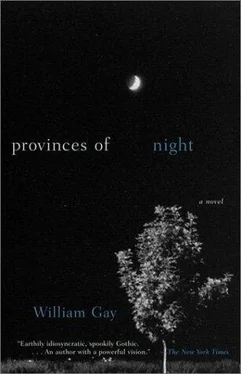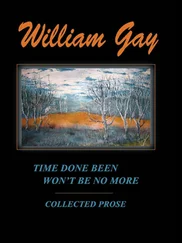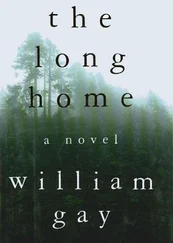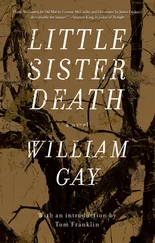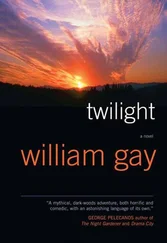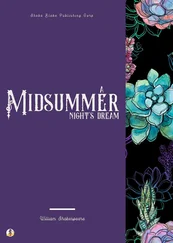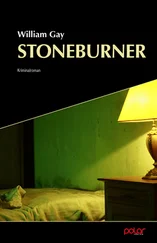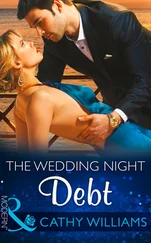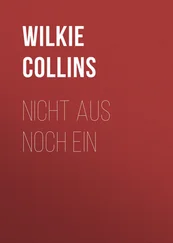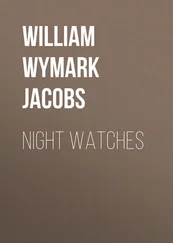What’s your name, oldtimer? Coble asked.
Rutgers, Bloodworth said without hesitation, wondering immediately where the name came from. After a time he seemed to remember seeing it on a seed catalog.
What kind of cattle you fool with?
Black Angus, Bloodworth said. But let me tell you. Back in the winter we was buildin a new silo and a section of scaffoldin come loose and that boy of mine fell. He never fell more than eight or ten feet but there was a walkboard swingin on a rope and it caught him right square in the head and knocked him coldern a wedge.
They Lord, Coble said.
Bloodworth nodded. That wasn’t the worst of it. He never had been right but this plumb addled him. He drug around like a chicken with the limberneck for a week or two and then one Sunday he decided he was goin to church. He never had been to church much, we never was big on churchgoin. Anyway he put on a suit and went, and what they tell me he cut a shine. Jumpin pews and rollin around foamin at the mouth like a maddog. Took some kind of Jesus fit and went to talkin in tongues. After that he went to preachin. He’d preach to just whatever. It didn’t matter whether folks’d listen to him or not. He’d preach to cows or stumps or just whatever was in front of him. Chickens. He baptized nigh every chicken I had on the place, drowned a bunch of Allen Roundhead fightin cocks I had.
Course I was laid up with a stroke of paralysis with this left leg stiff as a preacher’s pecker and I couldn’t do much about it. Then the doctor sent me to Hot Springs for the baths and that’s where I been.
Bloodworth paused, drank from the amber beerbottle. He glanced covertly at Coble to see how he was taking all this. He thought he might have been ladling it on a trifle heavy. But Coble’s porcine face showed no sign of disbelief, just a thin veneer of spurious commiseration masking opportunism, and Bloodworth took heart. He did not feel that Coble was overburdened with brains, and he was seized with a perverse desire to see how far he could go without Coble realizing the old man was making a fool of him: in addition to this, the old man had not taken any alcohol since his stroke, and he could feel a pleasant buzzing in his head that seemed to be in some manner lubricating his tongue. He pressed on, and felt free to let his imagination soar.
I was layin up there in Hot Springs takin the waters when I got a telegram about that boy. He’d gone plumb off the deep end. He’d started tryin to keep my cattle from breedin. Called it fornicatin. He couldn’t stop it so he started marryin em. Performin these ceremonies on em, reading out of the Bible. He was pairin em off a bull to a cow but there was more cows than there was bulls and what was worse he couldn’t keep em lined up the way he’d married em. They kept committin what he called adultery with cows they wasn’t married to and he couldn’t manage em. It was wearin him out. He was slippin around at night watchin em. When he couldn’t stand it no more he got a gun and shot four of my best bulls. He was tryin to drag a little Texas bull I had off a cow with his bare hands and that bull just figured I reckon he’d by God had enough and come off that cow and gored him. He’s layin up there in Vanderbilt opened up stem to stem and them doctors don’t hold out much hope for him. He’d have to improve some to be a vegetable, what they tell me.
Good God, Coble said. That’s the damnedest thing I ever heard, old-timer.
It’s been the ruin of me. I don’t even want to think about the doctor bills.
Where do you live, Mr. Rutgers?
I live about seventy miles back from Nashville.
I’m out of Memphis myself. I might just take them cows off your hands. That’s what I do, buy and sell cattle. You didn’t know that, did you? How’s that for a coincidence? I got caught in that mess of a parade and just had to wait it out.
If that don’t beat all, Bloodworth said. He took out a thin gold pocketwatch and popped the case on it. I got a bus to catch, he said. You call me up and we might work up a trade on them cows, if I ain’t done sold them.
Why we’ll go right now, Coble said. You’ll ride in my truck. We’ll drive straight through and if the cows suit me and the money suits you we might just strike up a deal. How’s that sound to you?
Why I hadn’t thought of it like that, Bloodworth said. That’s the very ticket.
I’m about ready to kiss this place goodbye anyway, Coble said. Mule parades and folks warpin one another with pool cues. I never seen such a place for foolishness.
The day was further progressed than Bloodworth had thought and by the time Coble was assisting him into the high cab of the truck evening shadows were lengthening and a fireball of sun lay low in the west. Coble turned the truck eastward and drove fast toward the open highway with Little Rock kaleidoscoping dizzily past the windows on either side and the road lying in wait like a promise someone had made them. When at length they were rolling toward the Tennessee line the old man was touched by a rising tide of exhilaration. Coble as well seemed touched by it for he began to sing. T for Texas , he sang loudly as the big truck strung the curves. T for Tennessee.

HE WAS COMING up the spring path carrying a bucket of water when he heard a car engine shut off at the foot of the hill. A car door closed and then nothing. Fleming set the pail down and waited. He knew it wasn’t Boyd. If a taxicab had let Boyd out the driver wouldn’t even have shut off the engine. He guessed it was Brady, and Brady had nothing to say that he wanted to hear. He approached nearer to the house, watching the rocky ledge of hill through the cedars.
A head appeared, a smooth oiled wing of auburn hair. Spivey Spivey in a shortsleeved nylon shirt, a brown paper bag tucked under his deformed arm. Goddamn it, the boy said. He sat down to wait.
He could hear Spivey knocking at the front door. Fleming, Spivey called. Hellfire, just go away, the boy thought. He wondered how persistent Spivey was, how stubborn. He was caught in a freezeout here without supplies or weapons, some hunter would kick his bleached bones out of the leaves some winter to come.
He looked. Spivey was standing on the porch silhouetted against a harsh cobalt sky, an electric sky in a failed painting. He wasn’t holding the bag. He stood a time as if undecided. Then he turned and went back down the hill. As if expecting a trap the boy waited not only until the car had started up but until it had turned at the mailbox and its sound had diminished down the road. Then he took up the water and went on.
The bag was on the doorsill tilted against the door itself. Three books. A book called Nine Stories by J. D. Salinger, Other Voices, Other Rooms by Truman Capote, a huge volume by Thomas Wolfe, Of Time and the Rifer. When he opened the Wolfe novel there was a thin sheaf of bills, two twenties and a ten, stuck to page one with a piece of transparent tape.

ALBRIGHT PARKED the car where a chainlink fence stopped him and followed the fence by touch until he found a gate. He’d commenced hearing the dogs when he cut the switch and they had grown louder, a cacophony of barks and howls and long plaintive moans such as wolves were told to call one to the other. He didn’t know if the dogs were walled in or walled out but there was a wild sound to their voices that stayed him with caution. So far he was trespassing, he hadn’t been asked in, he hadn’t even made it to a door to knock on. He guessed he should have come in the daytime but he had felt instinctively that this was a thing best done at night. He glanced about, picking out an escape route, a back door out of here, imagining himself levitating the chainlink fence with a dog’s teeth clamped in the tail of his shirt.
Читать дальше
